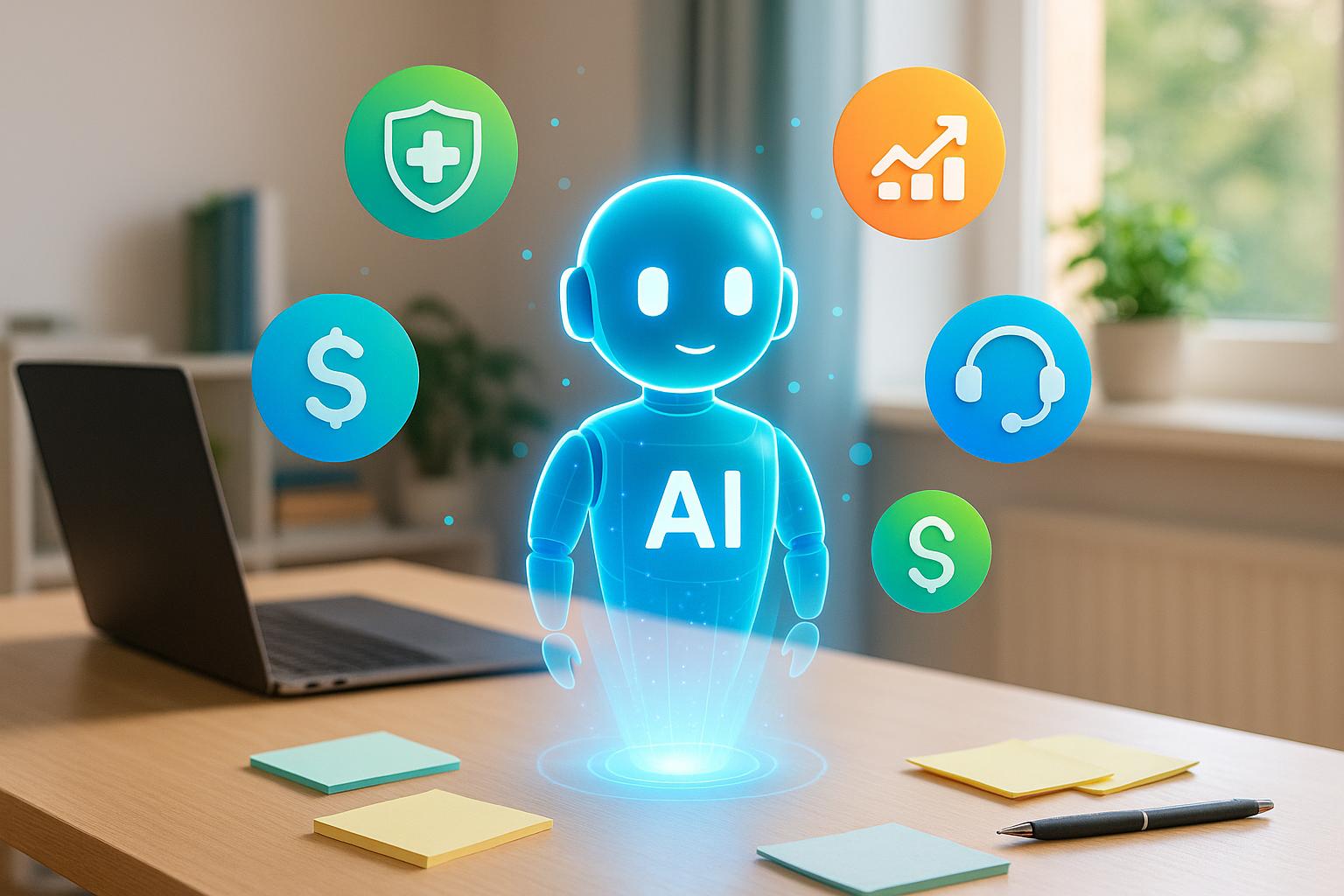
AI is transforming customer support in two key ways - cutting costs and improving efficiency. Here are 5 key ways AI helps reduce support expenses:
| Area | Cost Savings | Performance Gains |
|---|---|---|
| Automating FAQs | Up to 80% interaction handled | 14% higher agent productivity |
| 24/7 Support | No extra staff needed | Reduced wait times (e.g., 15 secs) |
| Training New Agents | $10,000–$21,000 saved/agent | 29% faster task completion |
| Issue Prevention | 25% lower costs | 45% shorter call times |
| Agent Productivity | 90% less ticket writing time | 40% automated interactions |
AI not only cuts costs but also boosts service quality, making it a smart investment for businesses.
AI can manage up to 80% of customer interactions, cutting costs while maintaining quality service.
Take Unity, for example - they saved $1.3 million and deflected 8,000 tickets by integrating an AI agent with their knowledge base. JP Morgan Chase's COiN system saves an impressive 360,000 hours annually, and Bank of America's Erica simplifies financial management with automated assistance.
Key advantages? Instant 24/7 responses, consistent accuracy, and scalable support.
Tom Eggemeier, CEO of Zendesk, puts it this way:
"With AI purpose-built for customer service, you can resolve more issues through automation, enhance agent productivity, and provide support with confidence. It all adds up to exceptional service that's more accurate, personalized, and empathetic for every human that you touch."
AI doesn't just handle inquiries - it boosts efficiency. Support agent productivity jumps by 14%, and 83% of decision-makers plan to increase their investment in AI for customer service within the next year. It's a game-changer for reducing costs and improving operations.
Solutions like Converso's can automate first-line support across platforms like webchat, WhatsApp, and SMS. Plus, they ensure a smooth transition to human agents when needed, keeping the customer experience seamless.
Providing customer support around the clock has traditionally meant high overtime costs and tricky shift management. AI changes the game by ensuring constant availability without the need for extra staff.
Take Bella Santé, a luxury med spa, for example. They automated 75% of their customer interactions with AI, bringing in $66,000 in sales and gaining over 450 new leads in just six months. Similarly, Suitor, a suit rental company, used AI to handle 85% of their customer service, cutting live chat response times to just 15 seconds.
Here’s how different industries benefit from AI-powered 24/7 support:
| Industry | Cost-Saving Benefits | Real Results |
|---|---|---|
| Retail/E-commerce | Handles order tracking and returns | 5–10% increase in gross profits |
| Financial Services | Manages account inquiries and fraud alerts | 46% higher customer satisfaction |
| Healthcare | Schedules appointments and sends reminders | 8 in 10 customers find AI helpful |
| Travel/Hospitality | Manages bookings and real-time updates | - |
These examples highlight how businesses across sectors can cut costs while improving service.
For instance, eye-oo reduced wait times from 5 minutes to just 30 seconds by using AI to handle 1,825 out of 2,233 support conversations. This kind of efficiency directly boosts financial performance:
"AI customer support offers a way to increase your finances, without jeopardizing your customer service quality."
But it’s not just about saving money - AI also makes scaling easier. It can handle sudden spikes in demand without requiring extra resources. ADT Security Service, for example, increased handled conversations by 45% while reducing missed interactions by 74%. And according to Gartner, by 2025, 80% of customer interactions will involve AI, showing the growing potential for cost savings and high-quality service.
Multi-channel solutions like Converso make it even easier to provide 24/7 support. Whether it’s webchat, WhatsApp, or SMS, businesses can ensure customers always get the help they need - while keeping costs under control.
Training new agents can be expensive, with costs ranging from $10,000 to $21,000 per agent. AI-powered tools are changing the game, slashing these costs while ensuring consistent service quality across your team.
Here’s what the data says about AI-powered training tools:
These improvements make onboarding new agents faster and more effective.
AI is reshaping critical aspects of training:
| Training Aspect | AI Solution | Cost-Saving Advantage |
|---|---|---|
| Knowledge Transfer | Real-time guidance systems | Cuts down product training time |
| Quality Assurance | Automated response suggestions | Reduces errors and rework |
| Productivity | Post-contact summaries | Speeds up after-call tasks |
| Skill Development | Custom learning paths | Helps agents become proficient faster |
In 2023, 78% of Customer Success teams were either using or planning to use AI to improve training processes. Why? Because AI acts as a 24/7 virtual mentor, helping new hires navigate their roles with ease.
"AI should be viewed as an elite personal assistant during this process. The human element is key to effective onboarding, especially for more complex products and services. However, AI can help streamline key areas that will ultimately improve the onboarding experience for your customers and your organization as a whole."
One standout feature of AI-powered tools is their ability to guide agents in real time. For example, when a customer needs help updating their payment information, the AI provides the agent with the right response and a detailed guide - all within their workspace. This reduces the need for extensive pre-launch training.
AI also simplifies post-interaction workflows. By automatically generating contact summaries and updating systems, it eliminates manual documentation, allowing new agents to focus on customer engagement instead of admin tasks.
Solutions like Converso take it a step further by offering pre-trained AI agents designed for common support scenarios. These tools help new agents ramp up quickly while maintaining consistent service quality across all interactions.
For businesses aiming to get the most out of their training budgets, AI-powered tools are a smart investment. Faster onboarding, fewer mistakes, and higher productivity mean new agents can handle customer inquiries effectively, using less time and fewer resources.
Preventing support tickets is cheaper and more efficient than fixing them. AI-powered tools can spot patterns and predict issues before they affect customers.
Companies using AI for preventive support have seen a 25% drop in overall support costs. This approach also helps teams resolve problems 44% faster and shortens call times by 45%.
Here’s how AI improves preventive support in key areas:
| Support Area | AI Prevention Method | Cost-Saving Impact |
|---|---|---|
| Transaction Security | Real-time analysis of transaction data | Savings from fraud prevention |
| Network Performance | Continuous system monitoring | Fewer outage-related tickets |
| Product Usage | Behavior pattern analysis | Reduced feature-related inquiries |
| Account Activity | Automated anomaly detection | Lower security incident rates |
Visa’s AI system is a great example. By analyzing 500 attributes per transaction, it saved the company $40 billion in a single year.
AI doesn’t stop there. It examines historical tickets, purchase trends, real-time usage data, social media activity, and customer engagement metrics to predict and prevent problems.
"AI enhances customer behavior prediction by processing vast data to uncover trends and patterns."
– Pragmatic Coders
Modern AI tools are designed to anticipate issues. Research shows that 72% of CX leaders believe AI will eventually handle all proactive service outreach. This shift is already delivering results: 59% of CX leaders report improved customer lifetime value after adopting AI.
Solutions like Converso take this further by analyzing customer interactions across multiple channels. Just like automated responses and 24/7 support, predictive AI helps cut costs by stopping problems before they happen.
"By anticipating needs, addressing issues before they arise and personalizing interactions, AI enables businesses to uplevel their CX, providing seamless, attentive and empathetic experiences."
– David Norrie, Senior Vice President of Product Marketing at Genesys
One way to maximize savings is by focusing on areas with the biggest impact. For instance, AI can monitor how customers interact with specific features. If it detects struggles, it alerts support teams to step in before frustration leads to a ticket. This not only reduces costs but also improves customer loyalty.
AI tools can significantly improve agent productivity by automating repetitive tasks and providing instant assistance. Research shows that with the right AI setup, ticket writing time can be reduced by as much as 90%.
Here’s a closer look at how AI supports agents in key areas:
| Task | AI Solution | Impact |
|---|---|---|
| Ticket Analysis | Conversation summarization | Cuts down manual review time |
| Response Creation | Smart suggestions & templates | Speeds up writing by up to 90% |
| Knowledge Access | Real-time information retrieval | Delivers instant answers from databases |
| Language Support | Automated translation | Enables replies in over 40 languages |
These tools are already delivering impressive results for businesses. For instance, Vuori, a sportswear brand, automated 40% of their chat interactions with AI, allowing agents to focus on more complex customer inquiries. Similarly, Key Health Partnership reduced insurance policy query handling by 50% by integrating AI with their support team, freeing up agents for more challenging tasks.
"Zendesk AI simplifies and eases the workflow on our agent side. The summarization feature has been a huge help, especially for onboarding new reps. It saves us the time and energy of looking through an entire thread so we can work more efficiently."
– Jessica Hannes, Director of Support at Esusu
AI tools also improve performance in several other ways:
Platforms like Converso take this a step further by offering features like a unified inbox and smooth handoff capabilities, which allow teams to manage conversations efficiently while maintaining excellent service quality.
"So far, 40% of all conversations coming into chat are fully automated using Kustomer's AI. This frees up our human agents to focus on more personalized interactions and complex issues."
– Chad Warren, Sr. Manager of Customer Service, Vuori
To get the most out of AI, choose tools specifically designed for customer support. These systems analyze past tickets, detect recurring themes, and suggest pre-written responses based on what has worked well in the past. With AI handling routine tasks, agents can spend more time solving unique customer problems, improving response times, and cutting support costs.
AI-powered support is reshaping customer service by cutting costs and improving quality. According to industry data, adopting AI reduces operational support costs by 35% while boosting revenue by 32%. These benefits make AI a smart investment for businesses.
Let’s break down the financial impact with some key metrics:
| Impact Area | Cost Reduction | Performance Improvement |
|---|---|---|
| Agent Productivity | $80 billion saved in labor costs by 2026 | 13.8% more inquiries handled per hour |
| Response Time | 30% lower service costs | 37% faster first responses |
| Task Management | 45% less time spent on calls | 80% of routine tasks automated |
Real-world examples back up these numbers. AkzoNobel, for instance, slashed their average response time from nearly six hours to just 70 minutes by leveraging AI-powered tools.
Platforms like Converso are leading this shift by offering multi-channel automation across webchat, WhatsApp, SMS and soon voice. They also ensure smooth transitions to human agents when needed, allowing businesses to scale their support operations without dramatically increasing costs.
"AI is transforming customer service and helping brands achieve lower operational costs, higher revenue, more efficient customer service, and happier customers." – Plivo
The future of AI in customer support looks promising. By 2025, 80% of companies are expected to use or plan to implement AI-driven chatbots. This trend could save businesses up to 2.5 billion work hours by the end of 2024.



